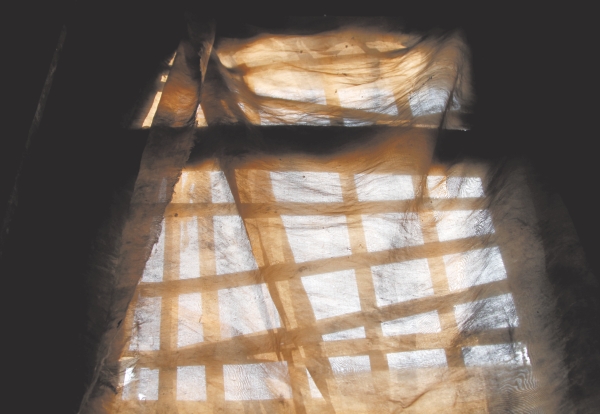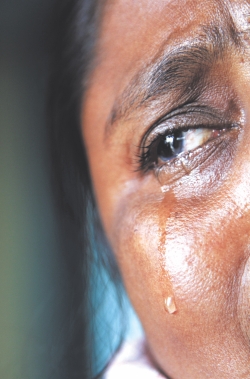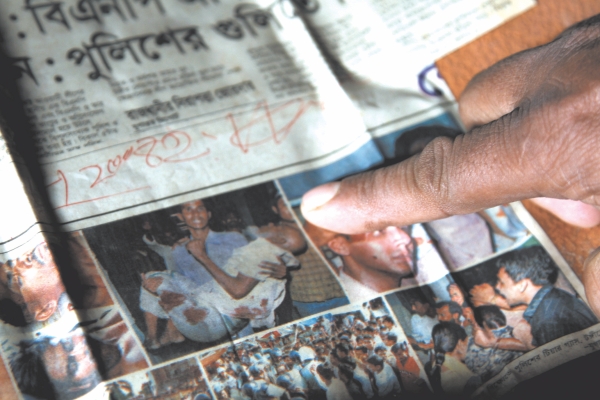| Home - Back Issues - The Team - Contact Us |
 |
| Volume 11 |Issue 05| February 03, 2012 | |
|
|
Cover Story
An Ominous Trend The unexplained disappearances of individuals who often end up as corpses have created a wave of terror among the people. Who are these abductors who often claim to be 'men from the administration'? Tamanna Khan Unfathomable anguish clouds Dipto's eyes as he turns away and gazes beyond the moss-covered pond on which his house stands. “He was a good man. He loved me a lot,” mumbles the 12-year-old, struggling to hide the tears that choke his voice. He does not cry like his mother and aunts–forced by fate to take care of his family which includes his five-year-old brother. Dipto is the man of the house now. Dipto's father, Mohammad Jamal Ahmed, a 32-year-old man, from the Amtali Keranitek slum in Tongi, Gazipur, was abducted in broad daylight on May 4, 2011 by 6-7 men, claiming themselves to be 'proshashoner lok' (people belonging to the administration).
Jamal, General Secretary of Awami Jubo League, ward-10, Tongi Thana, had gone to the Dhaka Electric Supply Company in Cheragali Squib Road to get an electricity connection for his home. Kabir Hossain, Jamal's brother-in-law who was with him at that time, had informed Kohinoor Begum, Jamal's wife, about the abduction. “My brother and two other persons were with him. They told me that all the abductors were tall and healthy; and except for 2-3, all of them were wearing white shirt and black trousers,” says Kohinoor. The security guard of the electricity supply office, one of the eye-witnesses, even provided Kohinoor with the registration number of the microbus which took Jamal away. Yet when Kohinoor went to file a general diary (GD) with the Tongi Police, they neither accepted the GD, nor did they take down the registration number. “The officer at Tongi thana said that if I gave them the number, it would become a case. It would not be a GD,” she relates. She shows the copy of the GD where it has been written that Jamal cannot be found. The word abduction is not mentioned anywhere in the GD. Jamal's older brother Md Abul Kashem says that one and a half months before Jamal's disappearance, the Rapid Action Battalion (Rab) had made an attempt to arrest Jamal for drug peddling but the raid failed. Therefore, after the "abduction" and because of the involvement of people “belonging to the administration” in it, the family's immediate reaction was to contact Rab-1 Headquarters in Uttara. However, Rab officials denied having any involvement with the arrest, claiming they had nothing to do with the microbus that took Jamal away. Contacted, Major Mustaque of Rab-1 told The Star to direct all queries related to cases of missing persons to the Legal and Media wing of the Rab. Commander M Sohail, Director of Legal and Media Wing of Rab, however, claims that the involvement of law enforcement agencies in enforced killing is a propaganda made by a certain section of the society and not by the families of the victims. “They are trying to create apprehension in the society by publicising such stories. You can hardly find any family member saying 'file a case against any law enforcement agencies'. Hardly,” he stresses. There are mainly three reasons why the victims' families do not file a case, says Sazzad Hossain, Programme Coordinator at Odhikar, a human rights organisation. “In most cases, there is lack of evidence strong enough to file a case against any specific law enforcement agency like the police or Rab. Secondly, most of these families are financially weak and finally they are frightened to fight against the state,” he explains. According to Mizanur Rahman Khan, associate editor of Prothom Alo and a constitution expert, our criminal justice system itself systematically violates the human rights of the citizen. He explains that since our judiciary has not earned its full independence and is still influenced by the executive according to Article 115 and 116 of the Constitution, no court of law can ensure justice for a citizen who has been wronged by the state. Moreover, the families of the victims face a completely new type of trauma once they try to fight a case in the criminal court, whereby a public prosecutor is appointed by the state for the plaintiff to handle the case. “Year after year passes by with a criminal case in court unless you appoint an expensive private attorney to work along with the public prosecutor. An ordinary citizen is harassed at every step of the criminal justice system.” When Numbers Talk The 2011 Human Rights report of Odhikar, comprising of data both from newspaper reports and in-house investigations, shows 30 people as victims of enforced disappearances. According to Article 2 of the International Convention for the Protection of All Persons from Enforced Disappearance – 'enforced disappearance' is “the arrest, detention, abduction or any other form of deprivation of liberty by agents of the State or by persons or groups of persons acting with the authorisation, support or acquiescence of the State, followed by a refusal to acknowledge the deprivation of liberty or by concealment of the fate or whereabouts of the disappeared person, which place such a person outside the protection of the law.” Among the 30, 14 were allegedly picked up by Rab, 11 by the Detective Branch, two by police and three by other law enforcement agencies. Dead bodies of five of these 30 men were found last year at different parts of the country in places like river banks and roadsides. It can be noted that almost all of the victims have either political or alleged criminal affiliation. Sazzad Hossain, Programme Coordinator at Odhikar, who has been working on incidents of abductions since 2009, says that the reason why law enforcement agencies are being suspected is because of the description of the abductors given by eye-witnesses: well-built men with cropped hair, often wearing similar outfits.
In all the cases, eye-witnesses have either stated that the abductors themselves claimed to belong to the administration (which in Bangladesh refers to the law enforcement agency) or their physical appearances matched those of law enforcement members. The method of abduction also matches the way arrests are carried out by certain law enforcement agencies of our country whereby the members do not show warrants or reason for the arrest. Moreover, like in Jamal's Ahmed's case, there are other instances where law enforcement agencies had made failed attempts to arrest the abductees. Instances where law enforcement agencies refused to disclose the whereabouts of the disappeared or arrested person, even when it was in their knowledge, are also not uncommon. The gravest concern of all is that enforced disappearances are taking place during democratic regimes not dictatorships, whereby a government and all related institutions are bound by the constitution to act with utmost transparency and accountability. Surprisingly, the government has not taken any significant step to address the issue.
Disappearance – Another name for Crossfire Explaining the possible reasons for such abductions, Md Mukhlesur Rahman, Director General, Rab says, “When a crime takes place, it is recorded at a particular police station and accordingly police investigate it. We usually look after the matter if anyone submits an application to us about a missing person. Every year we find many missing persons and even save those who have been abducted for ransom.” On the issue of the possible involvement of law enforcement agencies, Mukhlesur, in turn questions, “Why would they do so? Say a person is abducted; law enforcement agencies are responsible to find him. Why would they themselves carry out an abduction? What is their motive?” The same question looms large in the mind of the victims' families, as it haunts the psyche of every single citizen of the country. Why would such abductions, in which people claim to be law enforcers, repeatedly take place? Besides, if it were a new strategy adopted by the criminals, the abductors would have contacted the victims' families soon after demanding ransom. However, Jamal was not abducted for ransom. Kohinoor denies receiving any phone calls asking for ransom in the last nine months. Not only Kohinoor, Jharna Khanam, wife of KM Shamim Akhter, who was abducted in a similar manner four months ago, says she has not received any such phone calls or message. The morning of September 29, 2011 had started like any other regular morning in Jharna's life. Around seven in the morning she left for her office. An hour later, Shamim, had gone downstairs to get his daughter and mother a rickshaw. Jharna later learned that Shamim was abducted near a local shop. “From what I have heard from eyewitnesses, a group of 7-8 men came, surrounded him, put scotch tape on his mouth and took him inside a white microbus parked a little away near the Bot-tola mosque and drove away,” she says. She was also told that, at one point, Shamim somehow managed to tear the scotch-tape off and shout for help. “When passers-by tried to come to his aid, the abductors warned them saying, 'keu agaben na, amra proshashoner lok' (don't interfere, we are from the administration),” Jharna relates eye-witnesses' accounts. Haider Akbar Khan Rono, acting president of Communist Party of Bangladesh, says, “When Jharna came to me and I tried to find his (Shamim's) whereabouts, I found out that his name was in Rab's crossfire list in Khulna during the last BNP regime.” However, Rono refuses to disclose the name of his source, which he claims to be reliable. “They could not put him before crossfire then because he had left the country and was in Malaysia for some years. After his return, that order has been executed during this regime,” Rono asserts. “The Rab is being used by the Awami League and Bangladesh National Party regimes for their own benefits — for killing people unlawfully," says Rono. "This is called state terrorism. The state itself is carring out these murders and whichever party is in power commits this crime. Since the government is abusing its power, the Rab can even kill in return for money without any executive orders. And they are doing so." He believes that this has made Rab feel that they are not accountable for anything. The institution itself has become a terrorist organisation which has the right and freedom of killing men, without going to the court, opines Rono. While political pressure appears to be a major reason behind the killings, frustration among the law enforcers themselves regarding our criminal justice system can be another factor, explains Mizanur Rahman Khan. He says that there are a number of instances where police or Rab nabbed a top criminal, placed him before the magistrate court within 24 hours and the court gave him quick bail. Within 15 days the law enforcing agency received threats from that very criminal. These reasons, nevertheless, do not justify extrajudicial killings, he states. Mizanur Rahman, Chairman of Human Rights Commission, explains, “It has been seen in Latin American countries that whenever the society became vocal about extra-judicial killing, disappearances and enforced disappearance rose in those societies subsequently and no trace of the abducted person was found. When we first mentioned this point, the National Human Rights Commission had received one or two such complaints. I just expressed my concern." Rahman fears that extra-judicial killings have transformed into enforced disappearances. “Statistics show that from 2009 to 2011 a gradual decline in crossfire has been accompanied by a steady rise in enforced disappearances. This is a new form of killing,” says Sazzad. “Since there was a lot of international pressure regarding extra-judicial killings, the government had to take some steps. Besides, stories have to be fabricated for extra-judicial killing and law enforcement agencies have to produce a statement. But in these cases (enforced disappearances) nothing needs to be done. Thus from the very beginning they are refusing to take any responsibility,” he adds.
The Need for Clarity Shirin was shown a badge by one of the Rab members who arrested her brother Chhatra Dal leader, Nasik Ahmed Ananda, in the same way as in the above cases. According to Shirin, at 7 am on January 5, 2012, three men in plainclothes entered their house and went straight to Ananda's bedroom and woke him up. When he and his family members demanded the reason for the arrest, they hit him. “When we started shouting, they showed us a Rab identity card,” she recalls. However, in the chaos she could not get a good look at the card. After Ananda was taken away, Shirin's family went to the Mohammadpur Police Station and Rab-2 office at Mohammadpur, but no one there could give them any clue about Ananda's whereabouts. When Nur Khan Liton, Director, Investigation and Documentation Unit, Ain O Salish Kendra, was informed about Ananda's abduction, by a resident of Kaderabad Housing Society, he immediately tried to contact Rab headquarters and other places but could not locate Ananda. “The local Rab office told us that they did not know anything about this,” he relates. “In a society where such incidents are occurring and if we assume that criminals are faking Rab's identity to execute these crimes, then there should be transparency in Rab's work,” demands Liton. “When Rab carries out an operation in an area, the police force or Rab's unit of that area should be aware of it,” he asserts, noting that Mohammadpur police and Rab-2 office at Mohammadpur should have known about the arrest. Inspector General of Police (IGP), Hassan Mahmood Khandker, however, stresses that law enforcement agencies follow the Standard Operation Procedure while carrying out an operation. According to Hassan, if an arrest takes place, the local police station or Rab office should be able to provide information to the victim's family if not immediately but after a while. On the other hand, if the abduction is carried out by actual criminals in the guise of law enforcers, then police or Rab will obviously have no information to provide, he says. Hassan, however, notes that victims' families must report these cases to the local police station as soon as possible.
In the afternoon of January 5, 2011, Legal and Media Wing Director, Commander Sohail told the press that Ananda and four others had been arrested in relation with the murder of Mamunur Rashid, leader of Awami Shechashebak League. “At around 11 pm, we came to know that he was in Rab custody,” informs Shirin. Even if, for argument's sake, we assume that law enforcement agencies are not involved in enforced disappearances, secret killings and abduction, the government's responsibility for such incidents remains, opines Liton. “Since we, as ordinary citizens, have elected the government to look after our well-being, it is the government's responsibility to investigate these incidents that are causing panic and apprehension in the society. They need to investigate the disappearance, identify the actual people involved in these incidents and place them before the law,” he demands. “However, if we have reason to believe that law enforcement agencies, or members or groups within a law enforcement agency meaning a member or a group working within police or Rab, are involved in secret killing, abduction and murder, that too should be investigated,” he adds. However the Home Ministry has denied involvement of law enforcement agencies in these incidents. According to The Daily Star, on January 24, 2012, at a press conference held at the Secretariat, Home Minister Shahara Khatun said, “The law enforcement agencies are working to protect all...they're not working for enforced disappearances.” Referring to government efforts in investigating killings and the incidents of disappearance, she said, “The government also wants to know who are actually involved in such incidents.” Police IGP Hassan advises that to verify the identity of the individuals who come to take someone in custody, witnesses should request them to produce identity cards and ask which law enforcing agency, police station or Rab office they belong to. He says taking the guise of a law enforcer is a criminal offence; unfortunately it is the modus operandi of some criminals. “It is our job to enquire into the matter. So long we are giving utmost importance to such occurrences and we are dealing with this with utmost urgency,” he assures. Shirin is one of the lucky ones to at least know about the whereabouts of his brother, but Dipto is not. While Dipto's aunts cry inconsolably and say that even the dead body of their brother would have brought them some peace, Dipto's mother, Kohinoor demands of the state, “Where have these missing people gone? What is the reason behind their disappearances? What kind of law exists in this country?” We are all waiting for the answers. Copyright (R) thedailystar.net 2012 |
||||||





